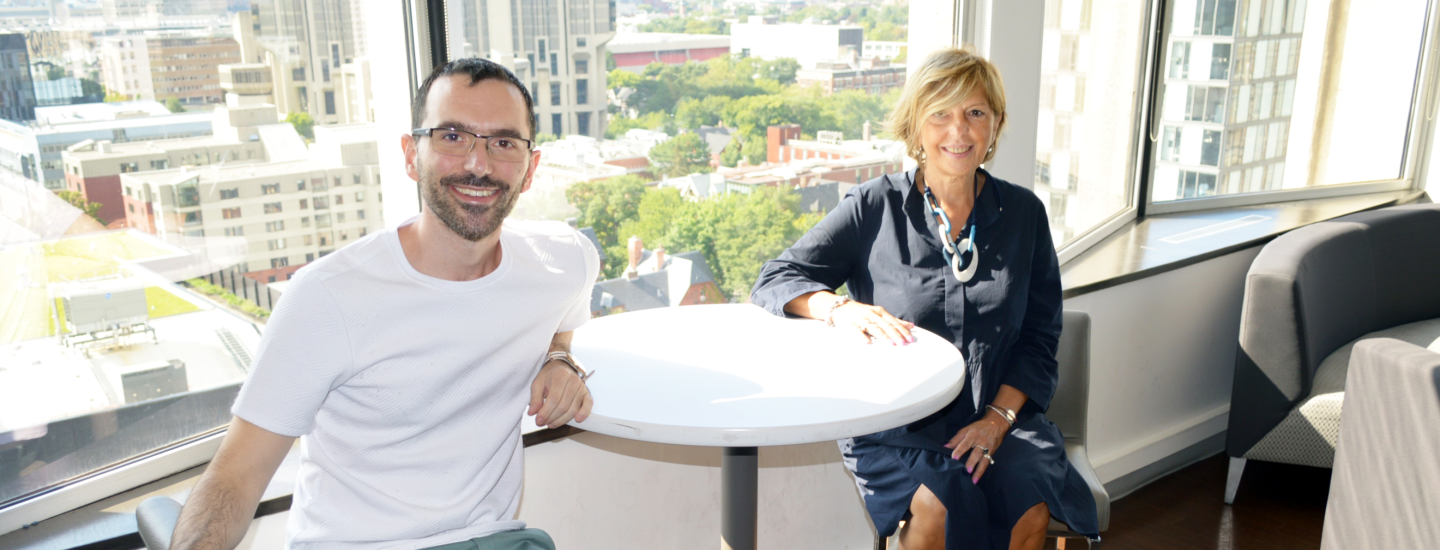
ELP instructors, Lorenzo Sclocco and Mary Di Pietrantonio, discuss what motivates them
Like learning a language, being a language instructor involves being a good listener. No one knows this more than Lorenzo Sclocco, English Plus instructor at the English Language Program and its most recent recipient of the School of Continuing Studies Excellence in Teaching Award. According to him, the best teaching material comes when it meets the student half way, presenting activities and challenges where learners have to figure out the rules of language for themselves. Because, as Sclocco puts it, “When an activity is cognitively challenging, the information will be stored easily and the learners are more empowered and comfortable with their learning.”
This is a much different approach to language instruction than the one used when Sclocco was learning German in high school. Then, language instruction meant teaching grammar of out a book, something Sclocco later found out while learning Russian was not as effective.
“I had a roommate who spoke Russian and I learned and recalled the language much better. This is because I was learning in my own way by creating conversions comfortably. It is a more natural way to learn the language and correct your mistakes,” he said.
This teaching method is called inductive learning—allowing language learners to notice patterns and work out how to use the language correctly themselves. In other words, learning the rules of the language come after using, reproducing, and listening to it. It is the opposite of the way Sclocco was taught German.
“Now, I think I have become the teacher I wanted when I was learning a language. I do a lot of inductive or task based exercises. Based on the learners’ mistakes, I develop lessons. This is what pushes me. It is all about the students and what they need and want to learn.”
“Now, I think I have become the teacher I wanted when I was learning a language. I do a lot of inductive or task based exercises. Based on the learners’ mistakes, I develop lessons. This is what pushes me. It is all about the students and what they need and want to learn,” he said.
And one of the ways the learners want to be taught is by using authentic language—the kind spoken during everyday situations. This is another difference between language instruction now and in the past, according to Mary Di Pietrantonio — Sclocco’s mother — who taught at the ELP during the busy August session and has over 20 years of English-language instruction experience.
“There is a lot of emphasis of speaking and the learners in my class wanted to learn this way. They expect it. It was a very nice surprise. I was not expecting the students to be so engaged and motivated in their learning because it makes you as an instructor want to give more and more to the student and this needs to be a win-win,” Di Pietrantonio said.
“As an instructor, I want to be able to give and reflect on my teaching. That’s what I enjoy, that back and forth learning.”
For both Sclocco and Di Pietrantonio, the learning—for both student and instructors— also happens outside the classroom. Not only do smartphones, podcasts, and the internet make accessing English and potential lessons easier than ever, but working at the ELP allowed them to collaborate with each other and their fellow instructors, facilitating a great learning experience in the class.
“It was nice to compare our approach even though we were teaching classes with different levels. We gave each other feedback and adapted what we had done in the classroom. We did this a few times and it made our lessons better for the students,” Di Pietrantonio said.
“It was motivating to work here. I really enjoyed it.”
Di Pietrantonio is also proud of her son for winning the Excellence in Teaching Award, one that relies on learners to nominate their instructor. For Sclocco, it came as a surprise.
“It was something I was not expecting and I thought, ‘Wow, I am really doing something for my students,’” Sclocco said.
“It was a great feeling. I really felt the appreciation.”
